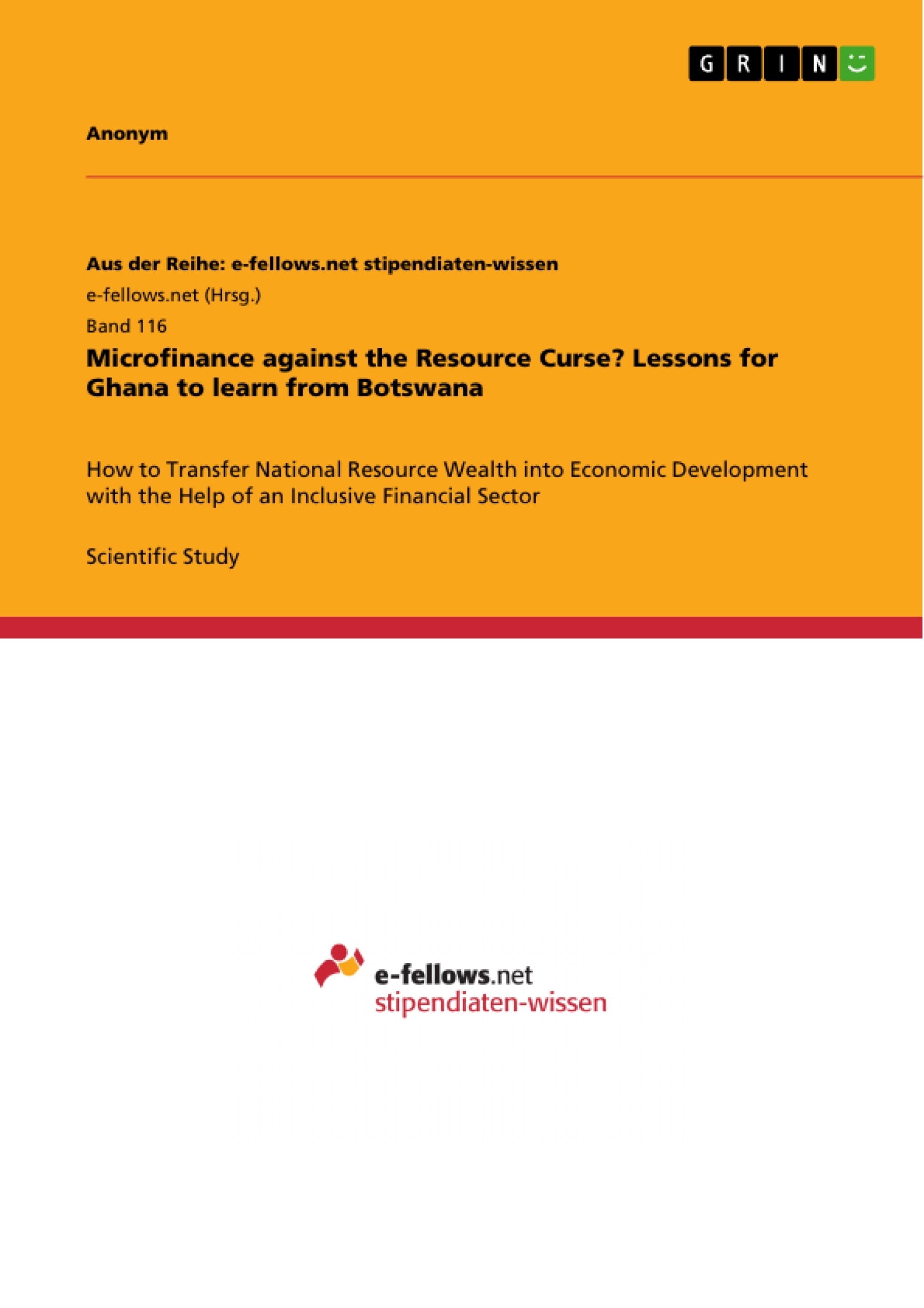This paper creates a linkage between the two at first sight unrelated concepts of the resource curse phenomenon, and financial inclusion with an emphasis on microfinance. I posit that in certain states of financial inclusion and with specific public policies for the financial sector and microfinance, the resource curse can be averted better in emerging economies. Hence, the focus of this work is not in the widely discussed institutional political realm whose deficient top-down approach often supports the resource curse. In contrast, I advocate an unconventional bottom-up strategy enabling the poor and marginalized parts of society to participate in the financial arena, which can prevent the resource curse phenomenon in countries rich in natural resources. In line with this idea I will present five proposals that foster an environment to absorb windfall revenues from natural resources positively. As a case study, Botswana’s successful development despite resource abundance is examined along those theoretical concepts of financial inclusion. For this country, the results strongly suggest that the financial sector is not key for explaining the positive trajectory of the country. Nonetheless, we can draw several conclusions from Botswana’s experience that serve as recommendations for Ghana. The West-African nation started exploiting petroleum this year, and is currently facing the challenge of averting the resource curse. I conclude that financial inclusion together with microfinance can aid Ghana in its future development and suggest specific policies that shall support the resource curse prevention in the country.
Inhaltsverzeichnis (Table of Contents)
- Introduction
- Conceptual Framework: The Resource Curse Phenomenon
- Background to the Study: Financial Sector Development and Resource Curse Evaluation in Botswana and Ghana
- Overview of the Financial Sector and Microfinance in Botswana and Ghana
- The Presence of the Resource Curse in Botswana and Ghana
- How Financial Inclusion May Help Prevent the Resource Curse
- Deficiencies of Current Approaches
- Proposals for the Development of Conducive Financial Inclusion
- Botswana as a Successful Example? Evaluation of the Theories
- Lessons to Learn for Ghana: Key Recommendations
Zielsetzung und Themenschwerpunkte (Objectives and Key Themes)
This paper explores the relationship between financial inclusion, particularly microfinance, and the resource curse phenomenon, focusing on the case of Botswana and Ghana. It aims to demonstrate how inclusive financial sectors can help prevent the resource curse and promote economic development in resource-rich emerging economies. The study challenges conventional top-down approaches and advocates for a bottom-up strategy empowering marginalized populations through financial participation.
- The resource curse phenomenon and its implications for resource-rich countries.
- The role of financial inclusion, specifically microfinance, in mitigating the resource curse.
- Comparative analysis of Botswana and Ghana in terms of resource abundance and financial sector development.
- Development of policy recommendations for Ghana based on Botswana's experience.
- The potential of financial inclusion to promote sustainable development and reduce economic vulnerability.
Zusammenfassung der Kapitel (Chapter Summaries)
- Introduction: This chapter introduces the concept of the resource curse, highlighting the paradox of abundant natural resources often leading to slower economic development. The paper focuses on the cases of Botswana and Ghana, examining the role of financial inclusion in mitigating the negative effects of resource abundance.
- Conceptual Framework: The Resource Curse Phenomenon: This chapter provides a theoretical framework for understanding the resource curse, outlining its causes and consequences. It discusses the concept of rent-seeking and the potential for corruption and conflict in resource-rich countries.
- Background to the Study: Financial Sector Development and Resource Curse Evaluation in Botswana and Ghana: This chapter examines the financial sectors of Botswana and Ghana, specifically highlighting the role of microfinance. It also evaluates the presence of the resource curse in both countries, providing a baseline for the subsequent analysis.
- How Financial Inclusion May Help Prevent the Resource Curse: This chapter explores the potential of financial inclusion to mitigate the resource curse. It examines the shortcomings of current approaches and presents proposals for developing conducive financial inclusion policies.
- Botswana as a Successful Example? Evaluation of the Theories: This chapter analyzes Botswana's economic development trajectory in relation to its financial sector and resource abundance. It evaluates whether Botswana's success can be attributed to its financial inclusion policies and provides insights into the factors that have contributed to its positive development.
Schlüsselwörter (Keywords)
This paper examines the resource curse, financial inclusion, microfinance, economic development, emerging economies, Botswana, Ghana, rent-seeking, corruption, and development policy.
Frequently Asked Questions
What is the "resource curse" phenomenon?
It is the paradox where countries with an abundance of natural resources tend to have slower economic growth and worse development outcomes than countries with fewer resources.
How can microfinance help prevent the resource curse?
By promoting financial inclusion, microfinance empowers marginalized groups to participate in the economy, creating a bottom-up strategy to absorb resource wealth more effectively.
Why is Botswana used as a case study?
Botswana is considered a success story because it managed to achieve high growth and stability despite being rich in diamonds.
What are the lessons for Ghana in this paper?
As Ghana starts exploiting petroleum, it can learn from Botswana's experience to use financial inclusion as a tool for sustainable development and to avoid corruption.
What is "rent-seeking" in the context of natural resources?
It refers to the practice of individuals or groups trying to obtain wealth from resource revenues through political influence rather than productive economic activity.
- Citar trabajo
- Anonym (Autor), 2011, Microfinance against the Resource Curse? Lessons for Ghana to learn from Botswana, Múnich, GRIN Verlag, https://www.grin.com/document/175291



